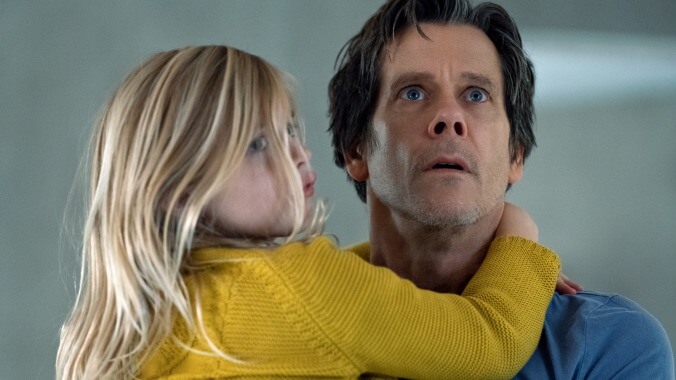Back in the autumn of 1999, Kevin Bacon starred in an eccentric Hollywood ghost story called Stir Of Echoes. The movie had the distinct disadvantage of opening in the immediate wake of The Sixth Sense, a bona fide cultural sensation to which it bore a superficial resemblance. Unfair though the comparisons were (a kid who sees dead people does not a twin film make), they did not flatter the later release. But Stir Of Echoes had one thing going for it (beyond its wealth of amusingly exaggerated Chicago personalities), and that was the nuance—the restless working-class soul—of its lead performance. Buried beneath the spirit-world hokum and mounting absurdities of the plot was a drama about a guy so disappointed in the direction his life has taken that he’s actually energized by the supernatural visions pinging around his head. At last, Bacon all but sighed while digging gaping holes in the front yard, I’m making something of myself.
This week, Bacon is back playing a family man experiencing shivery, hallucinatory flashes that just might be peeks into the world beyond. You Should Have Left isn’t a sequel to Stir Of Echoes, but it does reunite that film’s star with its writer and director, David Koepp, who’s adapted another novel into another horror movie of domestic unrest. Bacon, who’s now in his 60s, once again supplies more dramatic credibility than the material necessarily warrants, grounding its whispery what-lies-beneath tropes in such recognizable emotions as jealousy, guilt, and anxiety about getting older. But the movie itself turns out to be a much shoddier bit of carpentry; on the foundation of a real performance and with a blueprint provided by a book from Daniel Kehlmann, it builds a ponderous Blumhouse haunted house—one whose “scares” are just hints of a secret the audience will figure out faster than intended.
Bacon’s character, Theo Conway, is a wealthy, retired banker married to a thirtysomething actor, Susanna (Amanda Seyfried). Before one assumes this is just another case of Hollywood thoughtlessly pairing an older man with a much younger love interest, that May-November gap is very much integral to the plot; it’s a source of insecurity for Theo, whose discomfort over the sex scenes Susanna performs are an extension of his fear that she’s not satisfied with him. There’s also the tragedy of what happened to Theo’s first wife—a fatal accident that brought him a lot of tabloid attention and public scorn. Looking to escape the scrutiny and maybe to patch up their strained marriage, Theo and Susanna embark with their button-cute daughter (Avery Tiiu Essex) on a family retreat to isolated rural Wales, where they book a stay at a chicly modern house with a lot of light switches, secret passageways, and bad juju. Every night brings a ’mare, and it’s way too easy to get lost or lose time wandering the unexpectedly labyrinthine layout of its bottom floor. Plus, there are the creepy Polaroids pinned to the walls, the weird business involving the house’s mirrors, and some ominous warnings scribbled onto Theo’s meditation book…
Looked at one way, You Should Have Left is basically the Airbnb horror movie, reflecting the bone-deep terror of discovering that a dream vacation spot doesn’t quite match the idyllic picture painted by its listing. (Sure, the beds are huge, but what about the shadowy figures that blur by doorways in the dead of night?) Yet Koepp, who penned the scripts for Jurassic Park and Mission: Impossible, is less interested in the goosebump-provoking possibilities of his setting than its utility as a kind of metaphysical maze. To say that this is very much a movie directed by a screenwriter wouldn’t be a dig at his chops—he’s good with his actors and arranges a few creepy images, like the way a chandelier creates swaying shadows on a long staircase. It’d be more of an acknowledgement of the movie’s baldly, badly therapeutic design: What we’re really navigating, see, is the architecture of Theo’s mind. But did the spooky stuff have to be so perfunctory, all dripping bathtubs and silhouetted specters popping up in the periphery? The movie’s chief bogeyman, a croaking scold in a cap, is also a laughably un-intimidating monster—and that’s even setting aside the exceptionally obvious third-act reveal involving him. (Let’s just say that Koepp would have to had to shoot the phantom in a much different way for the audience not to catch on long, long before the movie comes clean.)
If you squint, it’s possible to see You Should Have Left as an allegory about rich, privileged men facing overdue reckonings. Theo, after all, has some skeletons in his closet, and the movie is interested in nothing so much as forcing him to uncover them, in a less literal manner than his Stir Of Echoes protagonist dug up the dark truth. Yet Koepp dampens the drama by mostly abstracting it into conceptual gimmickry: A house with a maddeningly shifting floor plan might be a solid metaphor for evading self-reflection, but after a while, all the faces in mirrors and rooms emptying back into themselves start to feel like substitutions for actual psychology. And the film leaves for a climactic twist something it really should have made a whole meal out of exploring. At least Bacon commits, putting all of Theo’s hangups on display and treating his scenes with Seyfried—including a humdinger of a subdued fight about Susanna’s own secrets—like the stuff of a genuine marriage drama, not mere emotional context for a ho-hum thriller. He makes Theo a real character, even as Koepp uses him more like a Rorschach test everyone would interpret the exact same way.










































